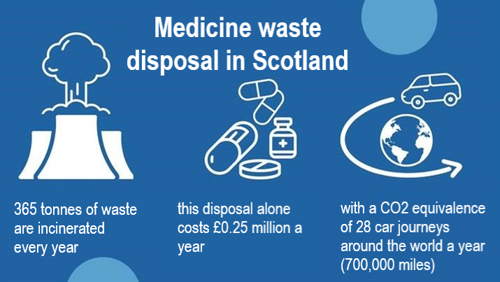Environmental impact of polypharmacy and healthcare
Over-prescribing is commonplace, accounting for at least 10% of all prescribed medications. It is estimated that up to 18% of unplanned hospital admissions are attributed to harm from medicines.5 About half of these admissions are deemed to be preventable, through methods such as effective medicine review, following the 7-Steps polypharmacy review process.
The healthcare industry is increasingly asked to account for the negative environmental impact generated through providing medical care. In Scotland, every 10 days a 10-tonne truck of medicines waste (returned to community and hospital pharmacies) is transported for incineration. These are the associated costs for incineration; travel costs and the environment impact (see the figure below) in addition to the direct costs of the unused medication.
Reduction of medicines waste can be achieved by ensuring appropriate prescribing and initiation of medicines, regular person-centred medication reviews and deprescribing where appropriate.
Reducing waste from medicines has a double carbon benefit by
- reducing upstream emissions e.g. in distribution
- downstream emissions, with fewer medicines to be disposed of
Medicines that are disposed of in general waste, poured down the sink or flushed down the toilet, increase the risk of environmental harm and may enter the human food chain in trace amounts. Residues from medicines which are unused, not properly disposed of, or from those that pass through the body, can be found in water, soil and sludge and in organisms at all stages of their lifecycles. Further information is available using the SEPA data visualisation tool for Pharmaceuticals in the Water Environment.14 With regard to inhalers, any remaining propellant gas in metered dose inhalers can be safely destroyed by incineration, which avoids it leaking into the atmosphere.
Unused or unwanted medicines should be returned to community pharmacy for safe disposal or recycling where available.
Annual cost of managing medicines waste in Scotland
